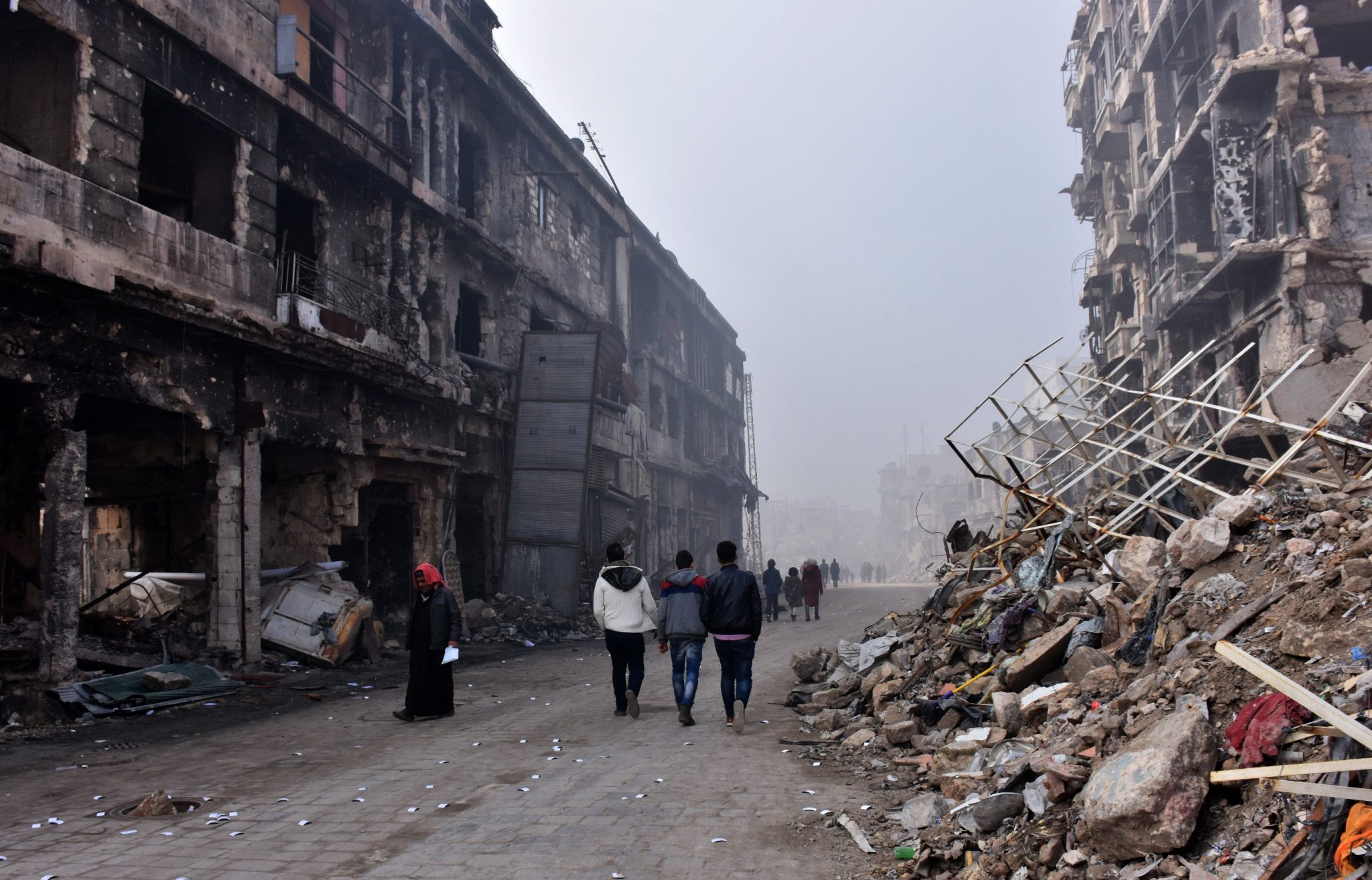

by Layal Abou Rahal
Agence France Presse
BEIRUT, Lebanon (AFP) — The Islamic State group is “completely besieged” in its last major stronghold in Syria’s Aleppo province, a monitor said Monday, as pro-regime forces pressure the jihadists on several fronts.
IS fighters were cut off in Al-Bab after forces loyal to President Bashar al-Assad’s government severed a road into the northern town, the Syrian Observatory for Human Rights reported.
“Al-Bab is now completely besieged by the regime from the south, and the Turkish forces and rebels from the east, north and west,” the monitor said.
The reported siege came as President Donald Trump Monday pledged that America and its allies would defeat the “forces of death” and keep radical jihadists from gaining a foothold on US soil.
“Today we deliver a message in one very unified voice to these forces of death and destruction — America and its allies will defeat you,” Trump said as he visited US Central Command, which plays a key role in the US-led mission to fight IS in Iraq and Syria.
“We will defeat radical Islamic terrorism. And we will not allow it to take root in our country,” he said.
Observatory chief Rami Abdel Rahman said Syrian regime forces and allied militias captured the last route between Al-Bab and Raqa, the jihadists’ de facto capital in the country.
At least 11 pro-government fighters were killed Monday in ongoing clashes around Al-Bab, he added.
Key prize
Just 25 kilometres (15 miles) south of the Turkish border, the town is seen as a prize by nearly all sides in the complex war.
Since December, Turkey-backed rebels known as the Euphrates Shield alliance have edged towards Al-Bab from the north.
“Al-Bab is more important for the Turks, who defined the town as a priority for their Euphrates Shield alliance,” said Syria expert Thomas Pierret.
But the regime was eyeing territory around Al-Bab “to protect the eastern flank of Aleppo city” it recaptured in December, he said.
It also sought to use the town as a buffer, “preventing the Euphrates Shield from advancing south” deeper into Syria.
Turkey and Russia back opposing sides in the war, but have joined forces in recent months to try to end the conflict.
They carried out their first joint bombing raids around Al-Bab in January after brokering a fragile ceasefire between rebels and regime forces.
Along with Iran, they organised a summit in Kazakhstan to try to reinforce that truce ahead of peace talks in Geneva later this month.
Those negotiations, hosted by UN special envoy for Syria Staffan de Mistura, are the latest attempt to end the six-year conflict.
Several rounds of indirect talks in 2016 between the regime and the opposition, represented by the High Negotiations Committee, ended without notable progress.
On February 12, the HNC will announce the members of its delegation to this month’s talks, the leading Istanbul-based National Coalition said Monday.
The main obstacle to progress in previous rounds has been the fate of Assad, who opposition forces say must leave power at the start of any transition period.
Rights group Amnesty International Tuesday accused his regime of a “policy of extermination” in a report alleging that as many as 13,000 people were hanged at a notorious prison near Damascus between 2011 and 2015, mostly civilians believed to be opposed to the government.
IS ‘on defensive’
On Monday, Assad told visiting Belgian lawmakers that Western policies towards the Syrian conflict had hurt Europeans.
“Most European countries adopted an unrealistic policy since the beginning of the war in Syria… damaging the interests of their own people by supporting terrorist groups,” he said.
Assad’s regime has refocused on IS since fully recapturing Aleppo city, in the biggest blow to the rebels.
IS is among several jihadist movements that have emerged during the conflict, which has left more than 310,000 people dead and displaced millions.
At least 14 government fighters were killed in clashes with IS in the central province of Homs Monday, the Observatory said, as Assad’s forces sought to advance backed by heavy artillery and air strikes.
The UN said Monday IS was “militarily on the defensive” across the region, struggling to attract recruits and facing falling revenues from oil and extortion.
But the UN report urged governments to be vigilant of IS efforts to find new revenue streams, citing concerns that journalists and aid workers travelling to areas recaptured from the jihadists could be targets for kidnapping.
© Agence France-Presse
